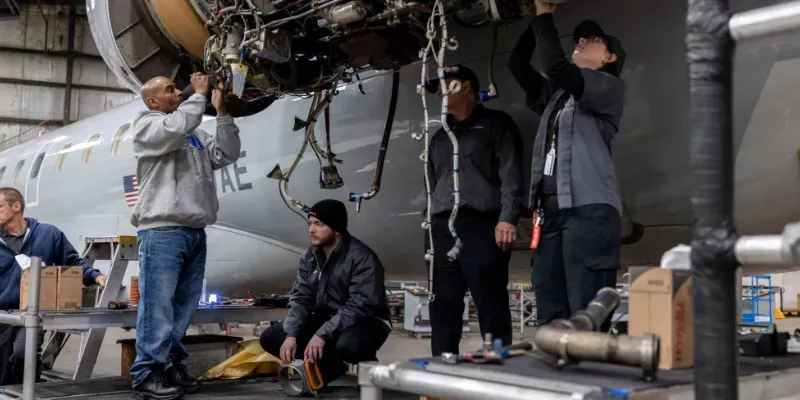

Two students graduated from the same aircraft maintenance course. One got hired right away, the other didn’t. Why? Today’s aviation industry needs more than just good grades.
In this post, we’ll show you the key skills employers really want—and how these skills look in real-world situations.
You may think that having a certificate and good grades is enough to land a job in aircraft maintenance.
But here’s the truth: employers expect more.
Employers Want More Than Just Technical Know-How
Yes, knowing how to fix an engine or read a maintenance manual is important. But so is how you think, solve problems, and work with others. Employers want people who can handle real challenges, not just answer exam questions.
Why grades and certifications are just the starting point
Think of your qualifications as your boarding pass—they get you through the door. But to stay on the flight, you need more. Companies are looking for students who show energy, curiosity, and the ability to learn quickly on the job.
The shift from knowledge to application
Knowing a concept is one thing. Applying it under pressure—like during a late-night repair or a pre-flight check—is what sets you apart. Employers are choosing students who can turn classroom lessons into hands-on results.
When it comes to aircraft maintenance, having strong technical skills isn’t just a bonus—it’s the base. Employers want students who don’t just know things but do things, with skill and confidence.
Let’s look at the key hands-on abilities that make you stand out.
Let's look at the soft skills that every future aircraft maintenance engineer must have to truly stand out.
Clear Communication in High-Stress Settings
Imagine you're working on a tight deadline to inspect an aircraft before its next flight. The team is under pressure. One small miscommunication, and a critical step could be missed.
That’s why clear communication is so important. Employers want students who can speak up, ask questions, and give short, clear updates. If you're explaining a repair, reporting an issue, or responding during an emergency, your words must be calm and focused.
Attention to Detail That Goes Beyond the Obvious
Have you ever spotted something small that others missed? Like a slightly worn bolt or a loose wire?
That kind of sharp eye is gold in this field. Employers look for students who don’t just follow the checklist—they see what’s really happening. Noticing the small things can prevent big problems.
In one real case, a student intern noticed a small crack during routine maintenance. Others had missed it. His attention to detail saved the airline time, money, and risk.
When it comes to getting hired in the aircraft maintenance field, many students focus only on technical knowledge. But here’s a secret: attitude and work ethic can often matter just as much, if not more. These two qualities are the hidden heroes behind successful careers.
Reliability is a Reputation, Not a Line on Your Resume
Anyone can write “reliable” on a resume. But employers want to see it in action.
Reliability means showing up on time, finishing tasks carefully, and being someone your team can count on. It’s not about being perfect—it’s about being steady, focused, and professional, even when the job gets tough.
Real example:
Imagine you’re working on a plane with a tight deadline. You stay late to double-check your work instead of rushing through it. That’s reliability. And that’s the kind of behavior that employers remember, long after the resume is forgotten.
Document What You Learn—Create a Skills Portfolio
If you want to stand out from the crowd, don’t just say you have skills—show them. One of the best ways to do this is by building a skills portfolio.
A portfolio is a collection of your best work, real examples of what you’ve learned and done. Think of it as your personal “highlight reel” for employers. It goes beyond a regular CV because it proves your knowledge with evidence.
You can include:
Keep your portfolio digital (like a Google Drive folder or a personal website), so it’s easy to share during job interviews. Make sure it’s organized by topic or skill—this helps employers quickly see what you know.
By showing your skills in action, you prove you're not just ready to work—you’re already doing the work.
Your skills are your runway to a great career. To get hired, you need the right mix: technical skills, soft skills, and a strong attitude.
Don’t just list them—show them. Use real examples, build a portfolio, and let employers see what you can do, not just what you know.